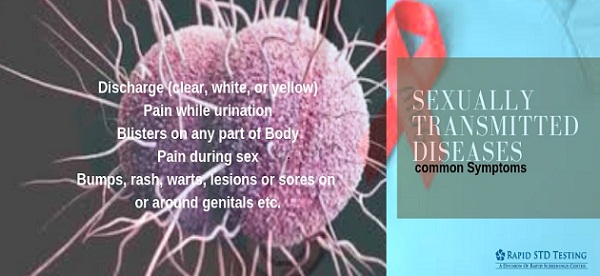Having sex is a natural phenomenon; therefore, safeguarding your
relationship via STD testing is imperative. Sexually transmitted disease, more
commonly known as STD is spread via having sexual contact with another person.
Some of STDs spread even due to skin contact, thus touching
another person can result an STD. Around 20 million people suffer from STDs
every year in America. However, the good news is that most of the STDs are
easily preventable. Thus, if you are
careful, you can prevent these diseases while enjoying sex at the same time.
NOTE: The only guaranteed method to prevent any type of STDs
is not to have sex at all. However, this might not be a practical solution for
many. Therefore, they need to adopt after safer methods to have sex.
Protected Sex
You will be surprised to know that STD prevention starts
even before the actually sexual activity takes place. Following some common and
easy steps would decrease your chance of being effected by an STD
significantly. Below, we have come up with some common, easy and effective step
to reduce the risk of STD.
- For starters, limit the number of people you are going to have sexual contact with.
- Both of you should honestly discuss your sexual histories.
- If you are under the influence of drugs or alcohol, it is better that you avoid sex.
- Before you have sex, get yourself and your partner tested.
- Get vaccination against Hepatitis B and human papilloma virus.
The key is to have an honest conversation with their
partner. However, many of the people don’t even know that you have STD. His or her lack of knowledge could lead to
another person being affected by an STD. To avoid this kind of situations, you
need to be tested.
In case you or your partner is not comfortable with the idea
of public STD testing, you can always perform confidential STD testing within
the vicinity your home. Several online websites offer the facility of online
STD testing with complete confidentiality including the Rapid STD Testing.
In case, you are suffering from STD, inform your partner
about it. This way, you both will be able to make a more leaned decision. It is
imperative to explicitly ask you partner whether they have or they had any type
of STD.
Practice Safe Sex
Having safe sex is important to reduce the risk of STD.
Here, we have come up with some effective tips that will help you have safe
sex.
- Usage of gloves for manual penetration is important
- Use dental dams for oral sex
- Use condoms of oral sex
- For intercourse, use female condom
- Use male condoms for intercourse
Taking bath or washing your private paths thorough after
having sec removes any infectious material on your skin. For women, urinating
right after sex is helps in reducing the risk of urinary tract infections.
Correct use of Condoms
In order to, correctly use condoms, you need to read the
instructions carefully. Following the instructions would reduce the risk of
sexually committed diseases significantly. Below are the precautions that you
should follow for safe use of condoms.
- Always check the expiry date
- Put the condom the right way
- Ensure that the air bubble of the condom pack in intact as this shows that the pack has not been punctured.
- Unroll the condom onto the penis
- Make sure that you leave some space at the top of the condom
- Remember to use lubricants that are condom safe
- To avoid slipping after you have had sex, hold onto the condom and then retreat
- Never reuse a condom
- If you take the condom off once for whatever reason, do not use that condom again
- Properly dispose of the condom
Possible Risks
There is no denying that condoms are excellent barriers
against all sorts of STDs. However, it does not guarantee 100% prevention. You
will be at risk of getting an STD that spread through skin to skin. Some of
these STD include HPV, Syphilis and Herpes.
In case you become sexually involved with someone who is
currently suffering from herpes. We would recommend that you talk to your
doctor about suppressive therapies. With these therapies, you can actually
prevent the outbreaks of herpes. In addition, these therapies help with in
preventing the spread.
However, they are not going to cure the problem. In
addition, you need to understand that herpes can spread even if the person does
not have an active outbreak.
Takeaway
STDs are common, but it is important to reduce their risk by
conducting STD Testing NYC. Rapid STD Testing is an excellent online platform
that provides you to test a number of STDs while sitting home. They ensure 100%
confidentiality and would developer accurate results in no time. They are among
the best online STD testing centers.







